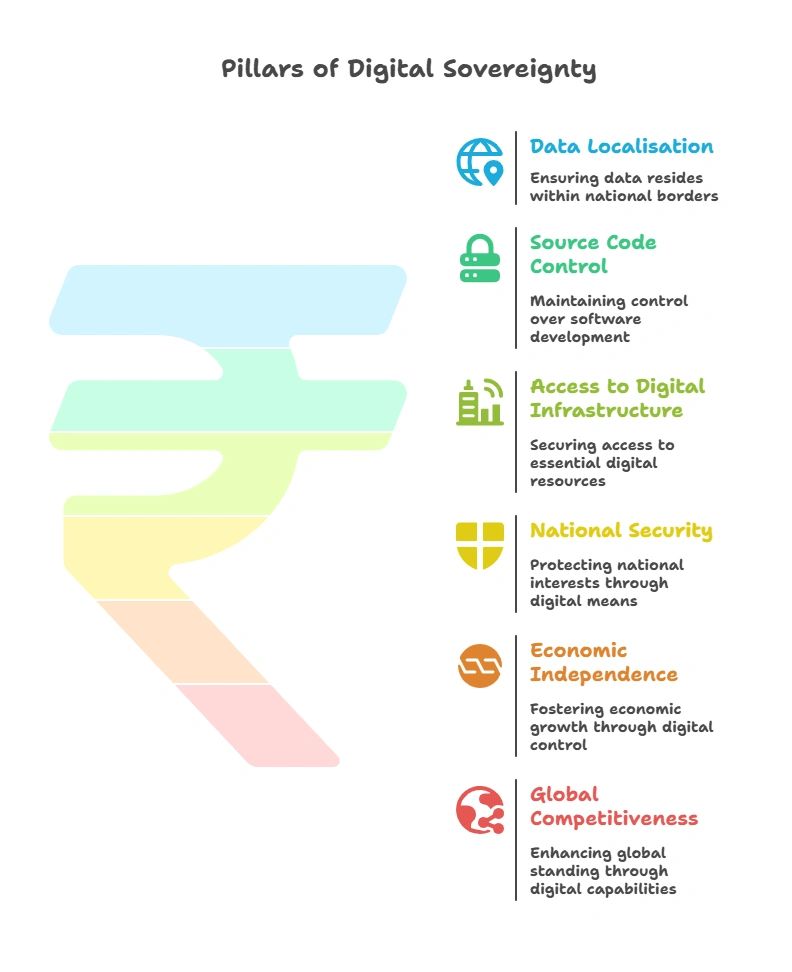Paper: GS – III, Subject: Economy, Topic: Trade and External Sector, Issue: Implications of India-U.K. FTA on digital sovereignty.
Context:
The India-U.K. Free Trade Agreement (FTA) has been promoted as a “gold standard” of India’s FTAs, claiming no compromise in sensitive sectors. However, the digital sector, despite being highly strategic, was compromised with little public debate or scrutiny.
Key Highlights:
Digital Sovereignty?
- Digital sovereignty refers to a country’s ability to control and protect its data, software, and digital infrastructure.
Concerns in the India-U.K. FTA regarding digital sector:
- Source Code Disclosure Clause: India has given up its right to seek source code access from foreign digital companies under the FTA even with critical infrastructure software.
- Limited regulation: The lack of source course disclosure may lead to loss of regulatory oversight weakening India’s ability to enforce software compliance. It also erodes of strategic autonomy in digital governance.
- Sectoral divergences: In other sectors like food and medicine, regulators have the right to source disclosure for safety and compliance. This is denied in the digital domain.
- Open Government Data norms: India agreed to non-discriminatory access to public data under “Open Government Data” provisions. This enables foreign access to India’s massive digital datasets and facilitates loss of competitive advantage in AI and big data sectors.
- National Resource Giveaway: Development relies like Artificial Intelligence (AI) heavily on training data. With India agreeing to share this freely, foreign companies can build AI models using Indian data, without investing in local infrastructure or partnerships. It weakens data as a strategic economic asset.

| India’s changed stance at WTO on Data Localisation: India has long argued for data localisation at global forums like WTO.But through the U.K. FTA, India has accepted clauses that contradict its earlier position.This weakens India’s stance in future negotiations and trade agreements.Implications of changed stance: Loss of Policy Space: India has surrendered the ability to design future digital regulations. Similar to earlier trade concessions in agriculture and industry, this could hinder India’s long-term digital industrialisation goals.Dependence on Foreign Tech: Without protecting source code or data rights, India risks becoming a consumer rather than a producer of digital technology. It leads to digital colonisation, Capital and knowledge flight and Weak domestic digital economy. |
Way Forward:
- Reclaiming Strategic Autonomy: India must ensure source code access in future agreements and reassert its demand for data localisation and digital sovereignty at multilateral platforms.
- Formulating a Digital Industrial Policy: India needs a comprehensive policy focused on indigenous data governance, domestic software ecosystemand strategic digital capabilities (AI, cybersecurity, quantum computing).
- Building Expertise: A national digital strategy should be guided by expert committees and multi-stakeholder dialogue (public, private, civil society)
- Repositioning India: India must position itself as a digital superpower, not just a digital consumer.
Conclusion:
India must balance openness with sovereignty, security, and long-term capability building. Even though India is a late mover, a strong start in digital industrialisation is essential for India to retain strategic independence in the 21st century.
La Excellence IAS Academy, the best IAS coaching in Hyderabad, known for delivering quality content and conceptual clarity for UPSC 2025 preparation.
FOLLOW US ON:
◉ YouTube : https://www.youtube.com/@CivilsPrepTeam
◉ Facebook: https://www.facebook.com/LaExcellenceIAS
◉ Instagram: https://www.instagram.com/laexcellenceiasacademy/
GET IN TOUCH:
Contact us at info@laex.in, https://laex.in/contact-us/
or Call us @ +91 9052 29 2929, +91 9052 99 2929, +91 9154 24 2140
OUR BRANCHES:
Head Office: H No: 1-10-225A, Beside AEVA Fertility Center, Ashok Nagar Extension, VV Giri Nagar, Ashok Nagar, Hyderabad, 500020
Madhapur: Flat no: 301, survey no 58-60, Guttala begumpet Madhapur metro pillar: 1524, Rangareddy Hyderabad, Telangana 500081
Bangalore: Plot No: 99, 2nd floor, 80 Feet Road, Beside Poorvika Mobiles, Chandra Layout, Attiguppe, Near Vijaya Nagara, Bengaluru, 560040
